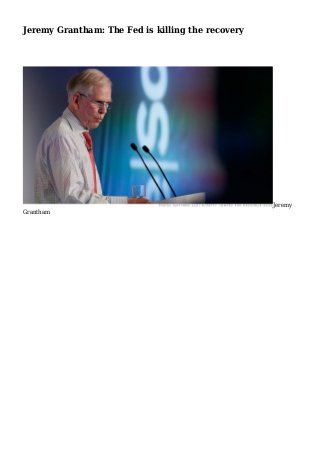
Jeremy Grantham: The Fed is killing the recovery
- 1. Jeremy Grantham: The Fed is killing the recovery Jeremy Grantham
- 2. FORTUNE -- If you hate the Federal Reserve, you have a new hero. A few weeks ago, Jeremy Grantham, the co-founder of money management firm GMO, called newly appointed Federal Reserve chairman Janet Yellen "ignorant" in the New York Times. He also said the reason for the slow recovery was not the severe financial crisis, continued high unemployment, or the many standoffs in Washington. Instead, he blamed the Fed for ruining the recovery it was supposed to stimulate. To someone who believes in the laws of economics, it's hard to overstate how odd that claim is. It's positively bonkers. Low interest rates stimulate the economy. The Fed has done everything in its power to keep interest
- 3. rates down, lower and longer than anyone can remember. That should have helped the economy. And yet the recovery has been just meh. So, either Grantham is bonkers, or he is onto something. Fortune recently caught up with him to find out. Fortune: You believe the Fed's policies, particularly quantitative easing, have slowed the recovery. What's your proof? Grantham: It's quite likely that the recovery has been slowed down because of the Fed's actions. Of course, we're dealing with anecdotal evidence here because there is no control. But go back to the 1980s and the U.S. had an aggregate debt level of about 1.3 times GDP. Then we had a massive spike over the next two decades to about 3.3 times debt. And GDP over that time period has been slowed. There isn't any room in that data for the belief that more debt creates growth. MORE:?The Fed doesn't care about the unemployment rate anymore In the economic crisis after World War I, there was no attempt at intervention or bailouts, and the economy came roaring back. In the S&L crisis, we liquidated the bad banks and their bad real estate bets. Property prices fell, capitalist juices started to flow, and the economy came roaring back. This time around, we did not liquidate the guys who made the bad bets. Can you really blame the Fed for the bailouts? That was an act of Congress. I don't like to get into the details. The Bernanke put -- the market belief that if anything goes bad the Fed will come to the rescue -- has had a profound impact on people and how they act. Okay, but that's still not proof that quantitative easing slowed the recovery. There's no proof on the other side, that the economy is any stronger from quantitative easing. There's some indication that the crash would have been worse and the downturn would have been sharper had the Fed not stepped in, but by now the depths of that recession would have been forgotten, the system would have been healthier, and we would have regained our growth. It's economic doctrine that lower interest rates boost the economy. Are you saying that's wrong?
- 4. Economic doctrine says the market is efficient. My view of the economy is not really principle-based. Higher interest rates would have increased the wealth of savers. Instead, they became collateral damage of Bernanke's policies. The theory is that lower interest rates are supposed to spur capital spending, right? Then why is capital spending so weak at this stage of the cycle. There is no evidence at all that quantitative easing has boosted capital spending. We have always come roaring back from recessions, even after the mismanaged Great Depression. This time we are not. It's anecdotal evidence, but we have never had such a limited recovery. MORE: Janet Yellen: The Fed will steer clear of bitcoin But the Fed does seem to have boosted stocks. Even if it did nothing else, doesn't a better market help the economy? Yes, I agree that the Fed can manipulate stock prices. That's perhaps the only thing they can do. But why would you want to get an advantage from the wealth effect when you know you are going to have to give it all back when the Fed reverses course. At the same time, the Fed encourages steady increasing leverage and more asset bubbles. It's clear to most investing professionals that they can benefit from an asymmetric bet here. The Fed gives them very cheap leverage on the upside, and then bails them out on the downside. And you should have more confidence of that now. The only ones who have really benefited from QE are hedge fund managers.
- 5. Okay, but then I guess that means you think stocks are going higher? I thought I had read your prediction that the market would disappoint investors. We do think the market is going to go higher because the Fed hasn't ended its game, and it won't stop playing until we are in old-fashioned bubble territory and it bursts, which usually happens at two standard deviations from the market's mean. That would take us to 2,350 on the S&P 500, or roughly 25% from where we are now. So are you putting your client's money into the market? No. You asked me where the market is headed from here. But to invest our clients' money on the basis of speculation being driven by the Fed's misguided policies doesn't seem like the best thing to do with our clients' money. We invest our clients' money based on our seven-year prediction. And over the next seven years, we think the market will have negative returns. The next bust will be unlike any other, because the Fed and other centrals banks around the world have taken on all this leverage that was out there and put it on their balance sheets. We have never had this before. Assets are overpriced generally. They will be cheap again. That's how we will pay for this. It's going to be very painful for investors. http://finance.fortune.cnn.com/2014/03/24/jeremy-grantham-federal-reserve/